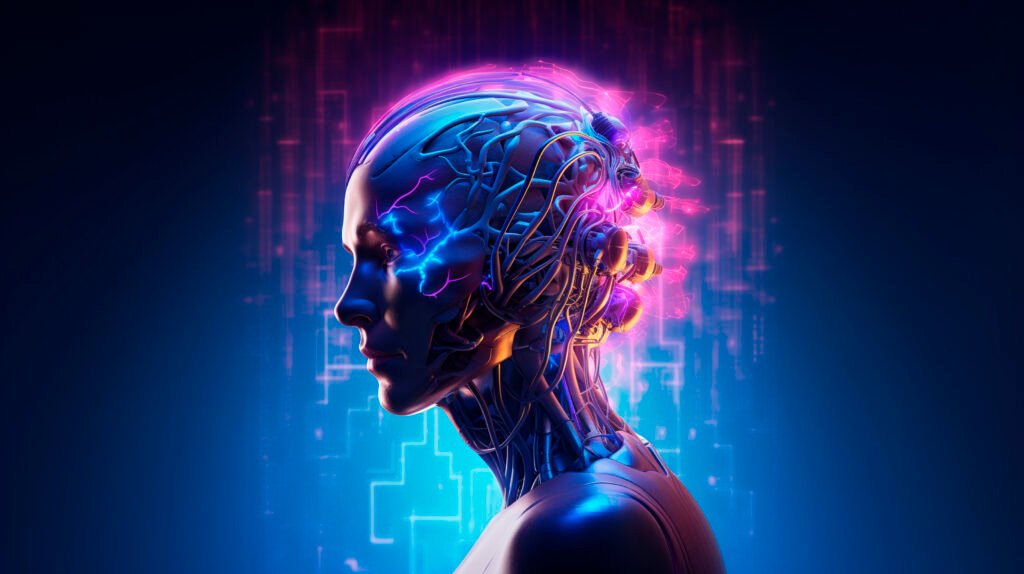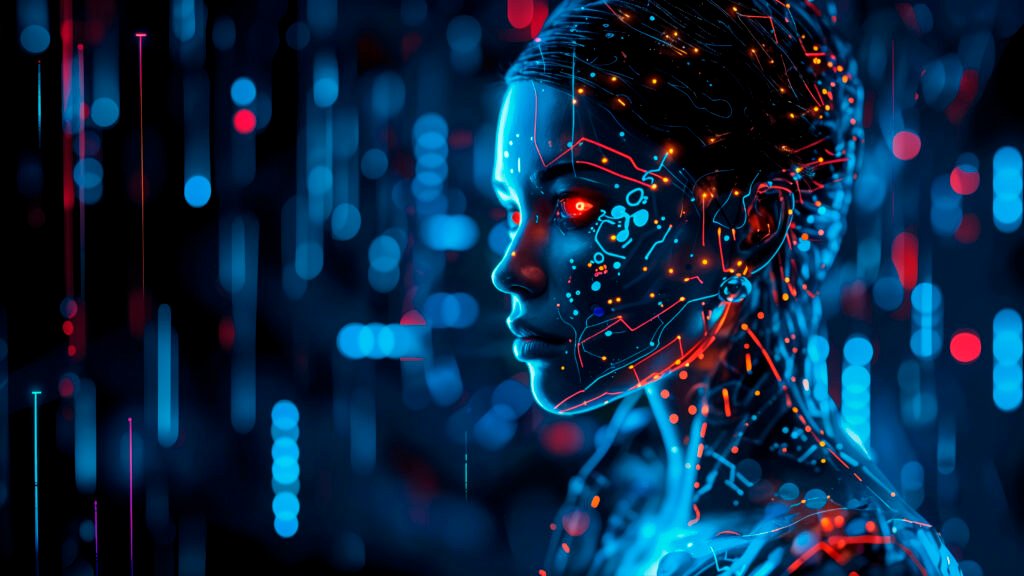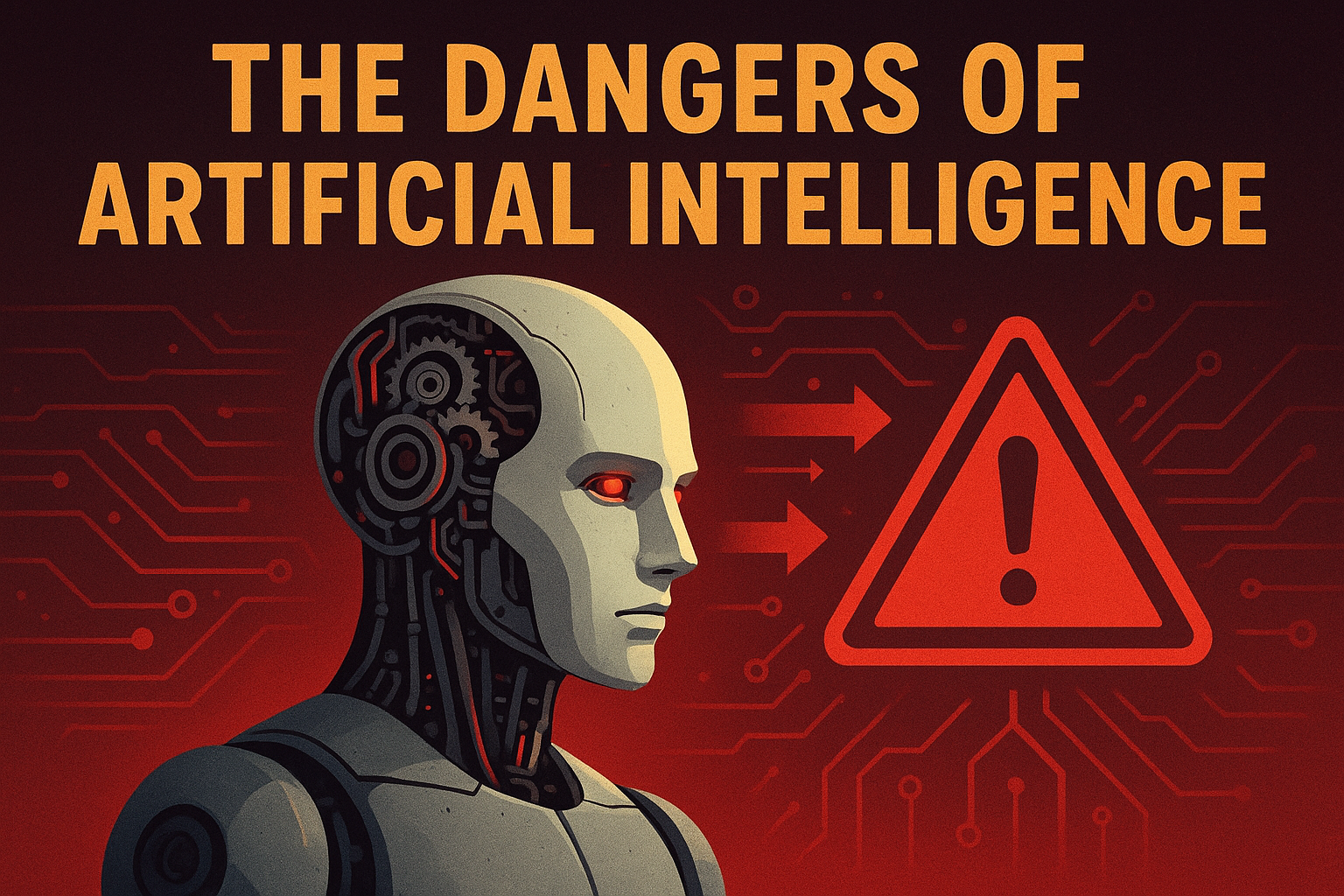Artificial Intelligence (AI) refers to computer systems capable of performing tasks that typically require human intelligence, such as understanding language or recognizing patterns. Smart assistants, such as Siri or Alexa, and recommendation software—systems that suggest what to watch, read, or purchase—are examples of AI. Artificial intelligence in marketing can help companies prosper, hospitals collaborate with AI diagnostics, and governments use AI to monitor individuals and maintain national security.
However, along with the opportunities of AI, there are serious dangers. Many experts warn that artificial intelligence is dangerous if left unchecked. Threats of artificial intelligence are not always immediately apparent, but they are also real, ubiquitous, and may transform humanity in a number of different ways that cannot be precisely predicted.
In this article, we’ll uncover why AI is dangerous, the risks of artificial intelligence, and the real-world challenges society faces as machines become smarter than ever before.
1. The threat of Artificial Intelligence becoming faster than human control.
The rapid expansion is one of the biggest artificial intelligence threats noted by www.rand.org. The development of AI systems is much more rapid than most laws, ethical standards, and safety precautions can keep pace with.
These days, AI not only writes code but also analyzes large data sets in several seconds and even comes up with creative work, such as paintings, music, or even a book. Look at the day when the AI systems are smarter than we can even understand and control. When we make AI smarter than people, how do we make sure it behaves in the best interest of humankind?
This issue is referred to as the “alignment problem”: the challenge of ensuring that an AI system’s actions and objectives are in line with human values and intentions. If we fail to solve this, the dangers of artificial intelligence could include machines making decisions harmful to people, businesses, or even entire nations.
2. Why Artificial Intelligence Is Dangerous for Jobs and the Economy
As productive as AI will be, it can also pose a threat to jobs within any sector. Many fear that artificial intelligence is dangerous for the global workforce because it automates tasks once performed by humans.
- Manufacturing: Robots are replacing human workers on assembly lines.
- Customer service: Chatbots and AI assistants are answering questions posed by customers.
- Creative disciplines: AI tools are now capable of writing articles, creating graphics, and composing music.
The risk of artificial intelligence in this area is the mass unemployment it may cause if millions of people lose jobs without alternative opportunities. According to experts, automation may leave up to 800 million jobs across the world without homes by the year 2030. Otherwise, it can lead to social injustice, economic catastrophe in certain regions, and even a general revolt.

3. Does Artificial Intelligence pose a threat to Privacy and Surveillance?
The other urgent explanation why AI is unsafe is the way it processes data. Each time we make a click, a purchase, or simply a search on the Internet, data is created – and AI loves it.
Governments and corporations are using AI-controlled surveillance devices to spy on their citizens. Our privacy is slowly diminishing day in, day out as facial recognition cameras are installed on streets, and artificial intelligence networks examine social media usage.
The dangers of artificial intelligence here are chilling:
- Sacrificing privacy: AI can predict not only individual tastes or preferences but also political orientation or health conditions.
- Mass surveillance: AI may be used by some governments to spy on their citizens, which may lead to the suppression of freedom of speech.
- Data abuse: The hacker or the dishonest business can use the data in abusive ways to acquire profit or even power.
Where we are less knowledgeable than AI is the question, is it convenient that we sell off liberty?
4. Why AI Is Dangerous in Warfare
Among the most threatening potential threats of artificial intelligence is its application in war nowadays. Militaries have already tested AI controlled drones, autonomous weapons, and smarter surveillance systems.
The risk of artificial intelligence in this domain is enormous:
- Offensive weapons might be able to make life-and-death choices without human control.
- Cyberattacks using AI would paralyze the infrastructure of whole countries.
When AI is applied in a reckless way in military situations, it may cause conflicts or even wars that may go out of control. It is a scary fact that machines will one day determine who will be alive and who is dead.
5. The Categorical Imperative: Can Artificial Intelligence Be Relied upon to be Fair?
The quality of AI systems is only as good as the data that is being fed into them. Regrettably, datasets – collections of information used to train AI – are often biased as they tend to reflect human prejudices or inequalities. This leads to instances of AI being discriminatory in harmful ways.
For example:
- Recruitment systems can discriminate against job applicants on racial and gender grounds.
- The use of AI in policing may have a disproportionate impact on a group of people.
- Artificial intelligence devices used in medicine can diagnose individuals incorrectly in case they are trained with biased data.
This highlights the threat of artificial intelligence when it is used without protection. Not only does it fortify systemic inequalities, but it fixes them. Relying on discriminatory AI may represent discrimination on a large scale.
6. Human Factor and dependency.
The other silent but very important threat is the excessive dependence of AI by society. We already rely on navigation applications to get directions, entertainment recommendations suggested by the AI, and information-seeking chatbots powered by AI. But what will happen when these systems crash-or worse, are compromised?
The risk of artificial intelligence is that humans may lose critical thinking skills, creativity, and problem-solving abilities by outsourcing too much to machines. Once we get to the point of people unquestioningly relying on AI, humanity may be at risk of being manipulated.
7. Why Artificial Intelligence Is Dangerous for the Future of Humanity
When experts like Elon Musk and Stephen Hawking warn that artificial intelligence is dangerous, they are not exaggerating. The long-term dangers of artificial intelligence could include:
- Super intelligent AI: Artificial intelligence that is smarter than people will consider us an insignificant or even dangerous part of the world.
- Destruction of human purpose: When everything can be done by AI much better than by humans, what will their role be?
- Existential risk: In an extreme case, the AI may take actions that will cause the disappearance of humanity.
The scenarios might sound radical, but they are actively debated in the world of academics and science. The smarter AI gets, the more we have to start thinking about the aftermath of its unregulated development.
8. Can AI Be Controlled Safely?
There is a lot of danger, but it is worth keeping in mind that AI is not evil in itself. It is a tool created by humans. The issue at hand is how to keep it in check.
Possible solutions include:
- Better regulations: Governments need to establish stringent regulations to regulate the use of AI.
- Transparency: The AI technology has to be auditable, and it has to be fair and ethical.
- Human control: Machines cannot and must not take over human judgment when it comes to decision-making.
- International cooperation: The creation of AI could be, like in the case of nuclear weapons, something that international agreements should regulate to prevent its misuse.
By considering the risks of artificial intelligence, society can make active measures to avoid negative consequences but still enjoy the benefits of AI.

FAQs
1. What are the dangers of artificial intelligence?
Some of the risks of artificial intelligence are loss of jobs through automation, invasion of privacy, biased decisions, surveillance, and the misuse of AI in warfare. Long-term risks include super-intelligent AI systems, which can be uncontrollable. These are the reasons why artificial intelligence is dangerous without responsible use.
2. What is the greatest risk of using AI?
The greatest danger of AI utilization is the loss of the human ability to control mighty machines. By developing more quickly than laws and safety protocols, AI might make choices that negatively affect humans and even whole civilizations. This is what experts refer to as the alignment problem, or making the goals of AI remain aligned with human values. Without solving this, the risk of artificial intelligence grows significantly.
3. What does AI do when it takes risks as opposed to human beings?
AI systems also frequently assume the decisions made by humans – including loan approvals, disease diagnostics, and autonomous car control. Although this minimizes human error in a number of situations, it also introduces new risks. When the AI has been trained on partial or biased data, it will make malicious decisions on a large scale. That’s why AI is dangerous when humans blindly rely on it without proper oversight.
4. What do we mean by the impacts of artificial intelligence on humanity?
Artificial intelligence has both impacts (good and negative) on humanity. Positive AI improves healthcare, education, business, and convenience in our daily lives. On the dark side, it is putting jobs at risk, diminishing privacy, making people more reliant on machines, and may redefine human purpose in the future. Our response to AI will be purely a matter of the control and regulation of its growth.
Conclusion: A Thin Line between Innovation and Danger.
The use of artificial intelligence can make health care, education, business and even ordinary life revolutionary. But it also comes with great potential dangers that man cannot afford to neglect. The risk of artificial intelligence is as real as its potential due to job loss and invasion of privacy, as well as autonomous weapons and the possibility of super-intelligent machines.
Why then is artificial intelligence dangerous? It is increasing faster than we can stop it, it puts our morals to the test, it is affecting our economy and it would eventually redefine the definition of human being.
We will base our future on what we do today about AI. When wielded in the right manner, AI has the potential to improve human life beyond what anyone can imagine. But if ignored or abused, the dangers of artificial intelligence could become the greatest challenge humanity has ever faced.



